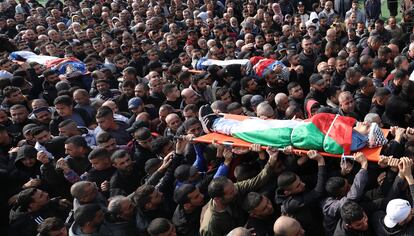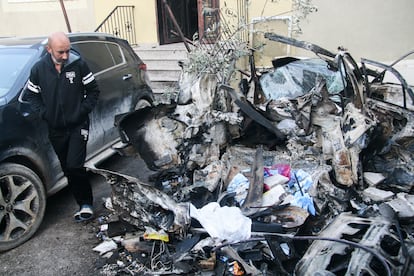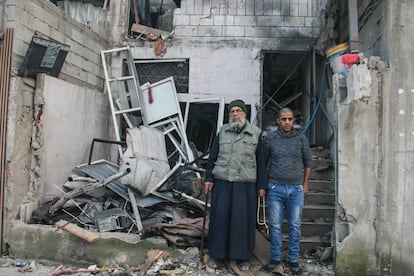Outrage in West Bank’s Tulkarem after six young people killed: ‘The person who kills our children is our greatest enemy’
A missile launched by an Israeli drone killed a group of friends, aged between 17 and 23, while they were hanging out together on a street in the Nur Shams refugee camp

The soil is still fresh in the cemetery of the Nur Shams refugee camp in the West Bank. In the land reserved for 18 martyrs who have been killed since October 7, six more graves have been dug. On Wednesday morning, Hamza, 17, Farez, 23, Yazam, 23, and Adham, 23, four cousins from the Fatmawi family, were buried. Next to them lie their friends Ahmad Hamarshi and Ahmed Issa, both 19 years old. A missile launched by an Israeli drone killed them while they were hanging out in the street, talking to each other and playing with their cell phones. They thought they were safe because the soldiers who raid the refugee camp almost every day were several miles away, destroying houses and cars, and arresting anyone they considered suspicious. “They were just some kids who wanted to spend some time together,” says their aunt Sara. “I wish they had done something for the Palestinian cause. Now I would be just as sad, but also proud.”
Since the Hamas attacks against Israeli towns near Gaza, which caused 1,200 deaths, the Israel Defense Forces (IDF) have been constantly conducting search and capture operations in the Nur Shams camp, where 13,500 people live crowded together. After two and a half long months of conflict, the camp’s street pavement has been completely smashed by the passage of the Israeli army’s D-9 military bulldozers, and in the labyrinth of narrow and steep streets, several buildings have been toppled. Since October 7, 24 people have died in clashes with soldiers. Residents are in a state of constant tension. In the last 24 hours, Israeli troops — with their jeeps and bulldozers — have appeared twice. The second time, at dawn on Wednesday, they were accompanied by the drone that killed the six young people.
Just behind the cemetery, in a plot dedicated to parties, weddings and all kinds of social events, a funeral is being held for the victims. Ahmed Fatmawi, 44, the father of Hamza, the youngest of the deceased, receives in single file the neighbors who come to give him their condolences and hug him while several children hand out coffee. He has a long black beard and is wearing a military jacket. He says that his son was with his cousins and friends in front of his uncle’s house when the missile fell; he wasn’t doing anything special, just hanging out with them, like every night. “After the explosion, they took him away in an ambulance along with another of the injured. He was still alive, he was breathing,” says Ahmed. But the soldiers stopped the ambulance to inspect it on the way to the hospital, he continues. “If they hadn’t, he might still be here.”
On the outskirts of the funeral site, a group of children laughs and plays with the bullet casings that have been building up on the ground for weeks. A flight of stairs of about 50 steps leads from there to the place where the attack took place. There is a hole left by the projectile on the pavement. The children play around it, putting a broom handle in. One meter to the right, there is a shop with metal shutters that have been completely rent by the explosion. In front of the business, the pink facade of Hamza’s uncle’s house is filled with shrapnel holes.

While the men continue mourning outside in the refugee camp, the women gather indoors, in a kind of communal hall with a large terrace a few hundred meters away. The children take Sara Fatmawi, 67, the aunt of four of the deceased, from the hall and sit her on the street, on a plastic chair. This woman, covered in a long black hijab that reaches to her waist, says that her nephews were normal kids, like any of those in the refugee camp. “They only thought about spending time with people their age. They were neither combatants nor militants of any group,” she says.
Sara then reflects on Hamza. “He was a fan of the Barcelona soccer team. He really liked soccer and played and trained on the Tulkarem soccer team,” she says. “He was in the 11th grade. Although he was not a very good student, he was so good at playing with the ball that we thought he might make a career out of it,” she adds. “Their mother went out to get them to tell them that there was a drone, but they didn’t pay attention to her. ‘Nothing is going to happen to us,’ they told her. ‘The soldiers are at another end of the camp.’” The mother’s tragic warning came true. Shortly after, the missile fell.
Sad and indignant, Sara says that her family comes from a small town on the outskirts of Haifa, in what is now Israel. “They stole our land, they turned us into refugees, and now they come here to kill us, what does Israel want?” she continues. “I just pray to God that they face what we are facing and suffer the pain that we are suffering,” she adds. “The person who kills our children is our greatest enemy. What are all these children going to do when they grow up after what they have seen?” she says, pointing to the group of children accompanying her. “They are just going to want to take a rifle so they can take revenge.”
Below, on the road that leads to the city of Tulkarem and that divides the countryside in half, is the house of Mohamed Odeh, 35. On Tuesday, in a previous raid, Israeli soldiers entered his home through a hole they made in the wall that separates it from the building next door. “I was with my whole family in the living room when they came in. My brother, who is disabled and in a wheelchair, was taken into custody. They blindfolded him, threw him to the ground and shot him in the leg,” he continues. “We believe he is in some hospital in Israel, but the Red Crescent has told us that they do not know anything about him.”

The military told Mohamed that they knew explosives were being put together in that building. “They searched the entire house, but they found nothing,” says Mohamed, who denies that he is a member of any Palestinian faction. “Then, they took us all out of the house, 13 family members in total. They put explosives inside and blew it up in front of us.” A few meters from his house, there is a mess of iron and loose parts, remains of what until yesterday was another neighbor’s car. The soldiers also placed explosives on it and blew it up.
After two days of hell, the residents of Nur Shams are awaiting a new attack. A group of children reported that military bulldozers and several army jeeps were loading fuel in an Israeli settlement next to the refugee camp. In the cemetery, in the corner designated for martyrs, just in case, the gravediggers have already dug a new hole.
Sign up for our weekly newsletter to get more English-language news coverage from EL PAÍS USA Edition
Tu suscripción se está usando en otro dispositivo
¿Quieres añadir otro usuario a tu suscripción?
Si continúas leyendo en este dispositivo, no se podrá leer en el otro.
FlechaTu suscripción se está usando en otro dispositivo y solo puedes acceder a EL PAÍS desde un dispositivo a la vez.
Si quieres compartir tu cuenta, cambia tu suscripción a la modalidad Premium, así podrás añadir otro usuario. Cada uno accederá con su propia cuenta de email, lo que os permitirá personalizar vuestra experiencia en EL PAÍS.
¿Tienes una suscripción de empresa? Accede aquí para contratar más cuentas.
En el caso de no saber quién está usando tu cuenta, te recomendamos cambiar tu contraseña aquí.
Si decides continuar compartiendo tu cuenta, este mensaje se mostrará en tu dispositivo y en el de la otra persona que está usando tu cuenta de forma indefinida, afectando a tu experiencia de lectura. Puedes consultar aquí los términos y condiciones de la suscripción digital.








































